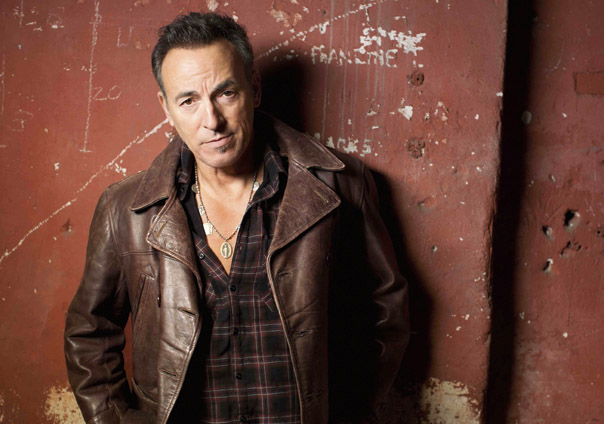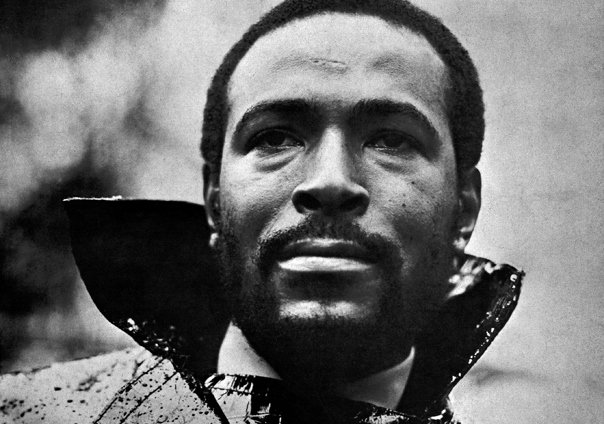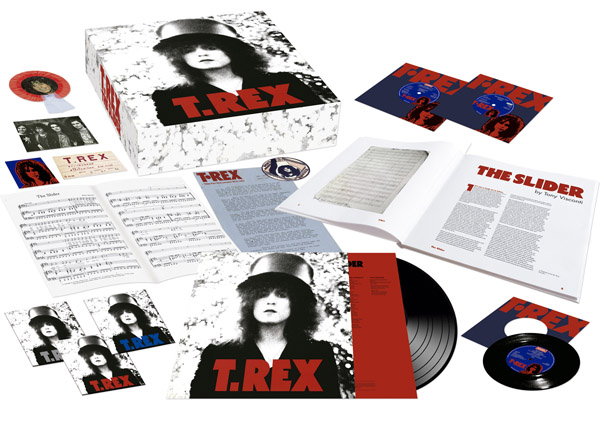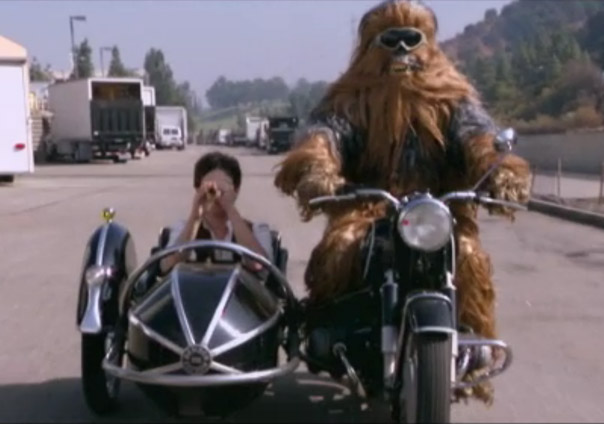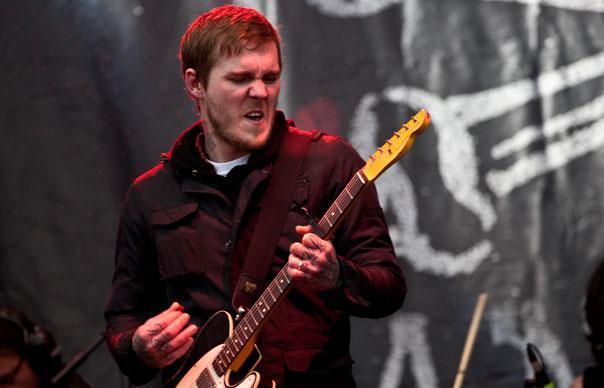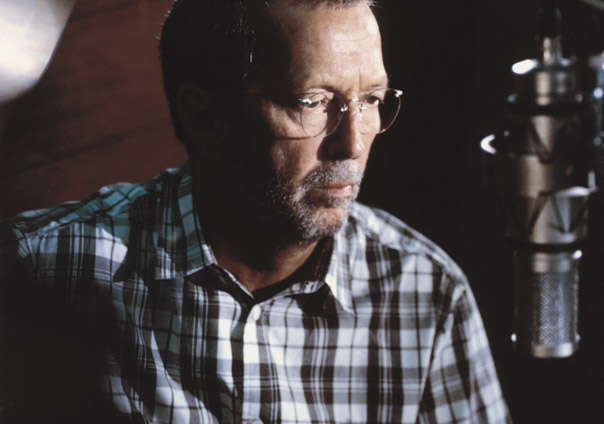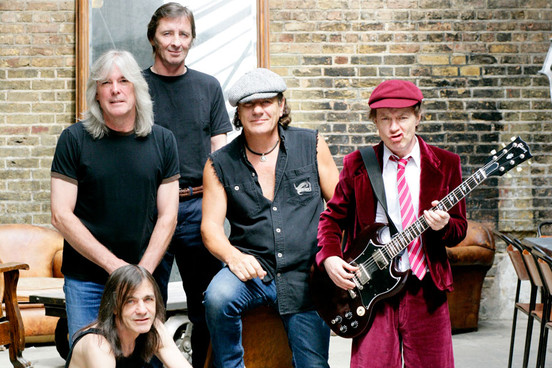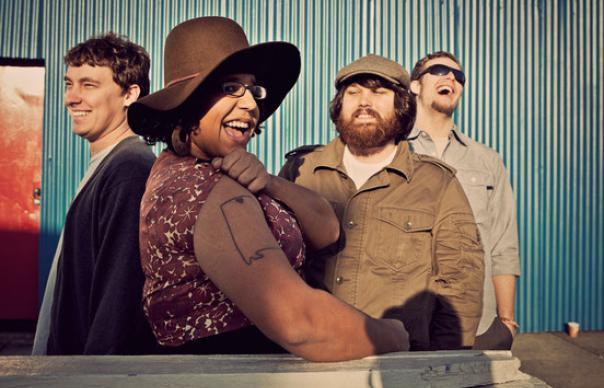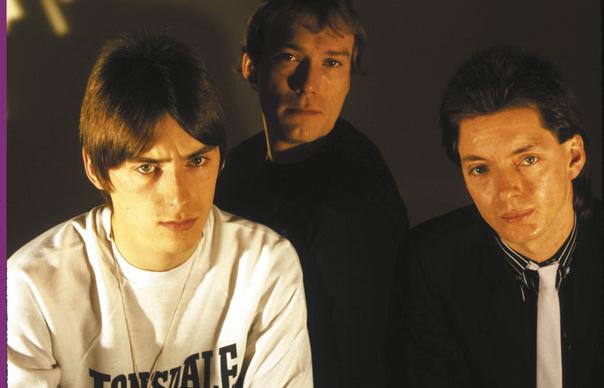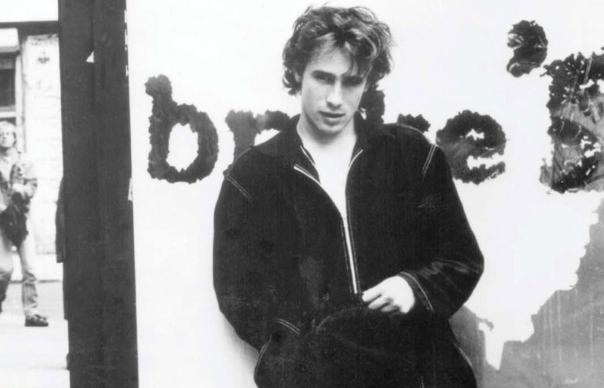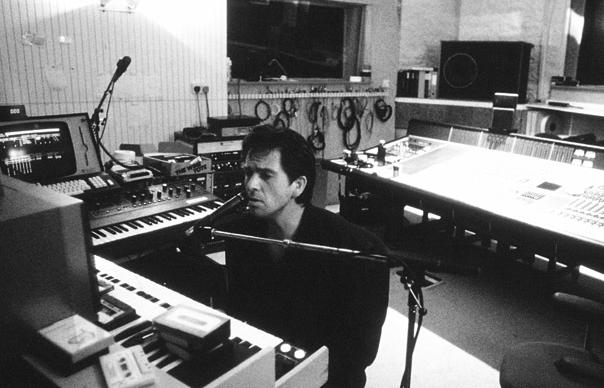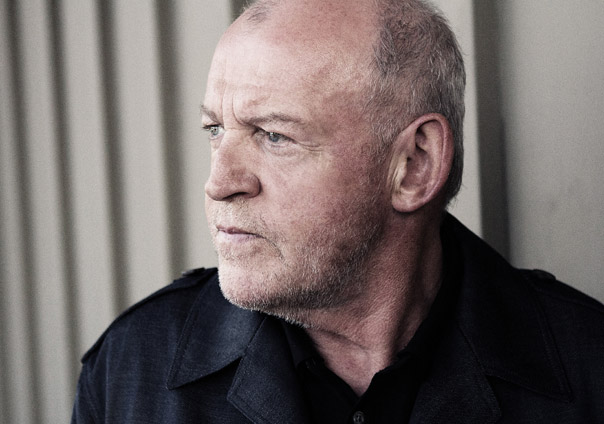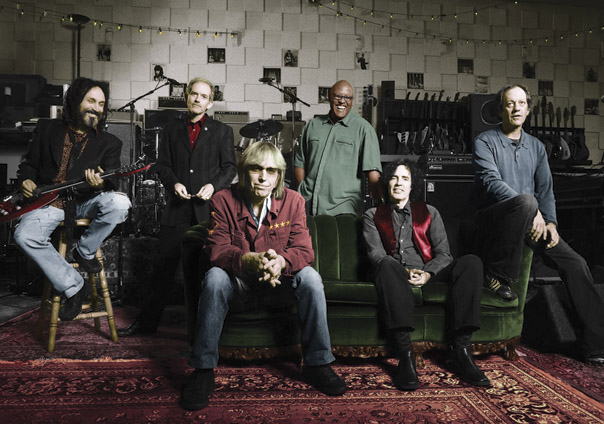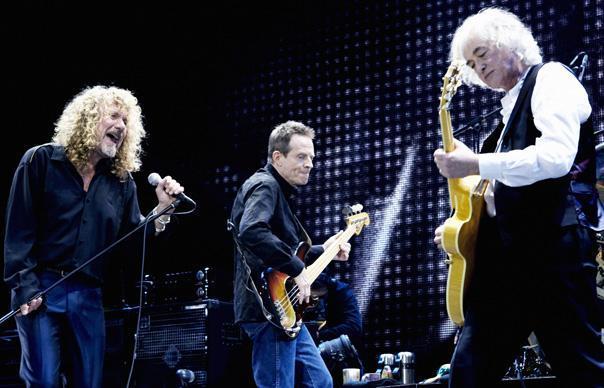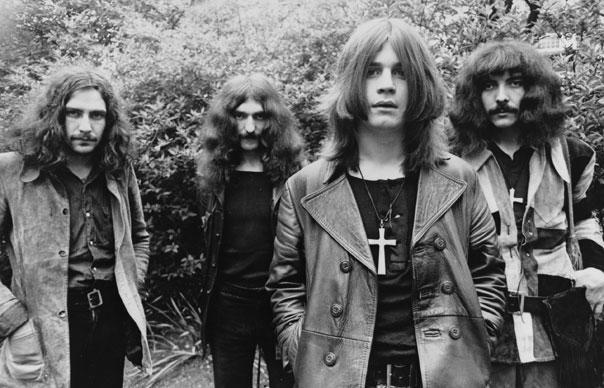The deluxe reissue of The Jam’s final album, The Gift, is reviewed in the new issue of Uncut (December 2012, Take 187) – so for this week’s archive feature, we’ve stepped back to Uncut’s December 2008 (Take 139) issue, to spend a year by Paul Weller’s side, as he celebrates his 50th birthday. We are invited into the Guv’nor’s inner sanctum, to his star-studded birthday party, and into dressing rooms across Britain and America. And we learn that, like any good mod, Weller remains “more interested in the future than the past”. Words: Paul Moody
_____________________
MAY 23, 2008. HAMMERSMITH APOLLO, LONDON
Forty-eight hours before his 50th birthday, and Paul Weller has just come offstage. The show has ended with a roaring version of The Jam’s “Eton Rifles”, a song he’s not played live in London for 25 years. Now, a surprise birthday party is being held for him in the upstairs bar of the Apollo.
In one corner, Roger Daltrey and Sir Peter Blake are reminiscing about mid-’60s Who gigs at The Marquee. In another, Noel Gallagher is congratulating The Office’s Martin Freeman on the quality of his tailoring. By the bar, Ian McLagan is deep in conversation with everyone from Bobby Gillespie to Mick Talbot. The drinks are free, and trestle-tables creak under the weight of quarter-cut sandwiches and sausages on sticks. When an unsuspecting Weller arrives, he’s greeted by a spontaneous round of applause. And when he’s caught his breath, he’s presented with a guitar-shaped birthday cake, complete with fountain-wheel fireworks.
“I had no idea,” Weller says later. “I said to everybody beforehand, I don’t want a fucking surprise party whatever you do. And then what do they do? I was fine anyway, because it had been such an amazing gig. Then my sister came through [into the dressing room] and said, ‘I’ve got to take you somewhere.’ And I don’t know why, but I had a thought in my head I was going to meet Paul McCartney. I had no idea. So I was suitably relaxed about it. It was nice actually, it got it out of the way.”
How did it end up?
“A few people came back to mine. The last I can remember, I was dancing round the garden at eight o’clock in the morning to David Bowie.”
Your birthday was two days later, on the Sunday. What did you do for that?
“I can hardly remember. I took the kids out, went to the park. It was a normal Sunday. I still can’t believe I’m 50. Where have all the years gone?”
Madonna and Michael Jackson also turned 50 this year. It’s hard to imagine them having parties with sausages on sticks… Or, indeed, dancing round the back garden to Bowie.
“There’s no comparison between me and them, really. Especially with Michael Jackson. He’s had such a weird life. He was a child star. It’s different for me. I’m not as universally massive as they are, and I wouldn’t fucking want to be. I’ve worked pubs and clubs. I’m more of a journeyman.”
__________________________
Today is the last in August, and Weller is sat poolside at the Loews Hotel in Santa Monica, looking back on 2008. It has been a momentous year for him, both personally and professionally, with his 50th birthday coinciding with the release of 22 Dreams and a career renaissance which has reasserted Weller’s often-overlooked spirit of adventure. From Black Barn Studios to Southern California, via shops, photo studios and concert halls, Uncut has tracked Weller throughout the year.
“You get people saying, ‘You’re too old for this,’ but they don’t realise that this is all I’ve done,” he says. “No-one told Miles Davis or BB King to pack it in. John Lee Hooker played literally up to the day he died. Why should pop musicians be any different?”
In a pale blue collarless shirt, silvery rosary beads and grey slacks, you could just about mistake Weller for any well-heeled Brit abroad – were it not for the grey-blond feather cut which he himself calls the “Weller wig”, and a steady stream of admirers all asking for photographs. Look a little closer at the details, though, and you can spot the Modish close attention to labels and fashion. The trousers are finely tailored Prada; the shoes, Italian slip-ons by Bottega Veneta. The gold-rimmed sunglasses that first appeared prior to 2005’s As Is Now have become a permanent fixture, acting today as both a handy protective barrier against the dazzling California sunshine as well as masking the conspicuous effects of a rock’n’roll lifestyle.
Weller himself is characteristically enthusiastic about a wide range of music – he lists Dr Dog, Kings Of Leon and The Rakes among his current favourites – with approval coming via a nodded “top bloke”. It’s only when conversation strays towards topics he’s less fond of – former bandmates or politicians, say – that he brings to mind Noel Gallagher’s description of him as “Victor Meldrew with a suntan”. But even then, he limits himself to a terse “I’m not having it,” rather than the splenetic rants of old. Who knows, maybe he’s finally mellowing at 50.
If you follow Weller’s gaze beyond the hotel veranda towards the Pacific Ocean, you can just make out the site of the Starwood Theater where, on April 14, 1978, The Jam made their US debut.
“I remember that gig well. We arrived at the venue in a double-decker bus. That was some daft record company stunt to introduce us to the place. The Dickies were supporting us,” he laughs. “There was a picture taken of us at the English pub, The King’s Head, which is still down the road.”
Did you think then that you’d still be here now?
“I never thought beyond tomorrow, to be honest with you. I didn’t imagine getting to 50, let alone still be playing music. When I was 18, I thought it’d all be over by the time I was 21. I saw the Stones’ movie, Shine A Light, on the plane on the way over, and Mick Jagger says pretty much the same thing. It’s the only way. At 18, 25 seemed like a lifetime away. Then before you know it, you’re 30. Then you’re 40. And all of a sudden, you’re 50. I’ve never thought beyond the next record.
“Especially from my vantage point now, I’ve seen so many people come and go over the years who make one great record and then you never hear of them again. It’s a tough business to be in, because to have any kind of longevity you have to sustain yourself. You can’t think beyond the next record. I never had any schemes, asking myself ‘Where will I be in 10 years?’ I still don’t. I don’t know what I’ll be doing when I’m 60. I’ll be happy just to be here.”
Sitting with Weller in the grounds of a four-star luxury hotel, overlooking Santa Monica beach, it’s tempting to see him as the great survivor who’s outlasted his 1977 peers, even celebrating in June his first No 1 album in six years, 22 Dreams.
“Getting to No 1 makes everyone feel better, of course it does,” he says matter-of-factly. “But it’s swings and roundabouts with these things. Sometimes you make a great record and it clicks with people. And other times it passes them by, there’s nothing you can do. It’s still the same record. If you start believing what the critics said, you’d end up in a complete mess. I remember seeing some of the reviews that said, ‘This is Weller’s most experimental album since Confessions Of A Pop Group.’ Well, in my recollection, everyone fucking hated that record.”
__________________________
JANUARY 30, 2008. BLACK BARN STUDIOS, RIPLEY, SURREY
The first playback of 22 Dreams is a select, invitation-only event at Weller’s Black Barn studios. Black Barn itself is tucked away at the end of a country lane in Ripley, 10 miles from Weller’s hometown, Woking. The taxi drops me off next to a parking space reserved for “The Governor”. Follow the path around the side of the building and you catch glimpses through a window of gold discs lining the wall of Solid Bond, Weller’s management office, formerly run by his father, John, and more recently his son, Nat.
And then here’s Weller, cheerily enquiring, “Fancy a Stella?” as he leads us through into the studio itself. On the walls, there’s a picture of The Beatles by Klaus Voorman, a present from Noel Gallagher, and a Small Faces poster signed by Ian McLagan with the words “Thanks for all you’ve done for us.” One wall is taken up by a huge Union Jack flag. In a corner, there’s a vintage Seeburg jukebox, and a quick glance reveals 7-inch singles by Glen Campbell, Lee Dorsey, Robert Wyatt and Aretha Franklin, plus Weller’s unofficial theme tune, “Peacock Suit”.
In a back room adjoining the studio, one wall is taken up by a vast rack of guitars. For anyone who’s followed Weller’s musical progress across the past 30 years, some are instantly familiar; one stand-out, for instance, is the ‘Whaam!’ guitar he used in the “Start!” video.
Tour over, and Weller is keen to get on with the playback. Which he does by turning the speakers up to a deafening level. Over the course of 70 minutes, the extraordinary sprawl of 22 Dreams is revealed – rock, funk, soul, free jazz, krautrock, classical, spoken word and electronica. When it’s over, Weller plays the whole thing again – still at ear-splitting volume – before we decamp to the kitchen for a post-playback beer.
“I can’t believe what I heard,” says Acid Jazz label boss, and Weller’s close friend, Eddie Piller. “To me, it sounds like the culmination of everything Paul holds dear. You can hear The Kinks, the Isley Brothers, Coltrane, Nick Drake. It’s a mod record in the original sense of the word – taking the best of everything and creating something new out of it.”
According to some people close to Weller, 22 Dreams very nearly never happened at all. One source even goes as far as to suggest that in the months before recording, Weller seriously considered quitting for good.
“Paul has always said he’d retire when three things happened,” the source explains. “His dad retiring, him getting to 50, and waking in the morning and feeling like it was just a job. Last year, all three of those things were happening, or about to happen. Because of that, he went into the studio thinking, ‘This is it. I’ll do one final record, and that’ll be that.’ It was the last roll of the dice.”
It’s not the first time Weller’s considered calling it a day. I remember visiting him backstage in Nottingham, in February 2005, to find him wondering whether he should pack it in.
“Why should I bother carrying on?” he said, before alluding to the poor early sales of the album he was then promoting, As Is Now. “If people aren’t buying the recordings, I’ll do something else.”
Intriguingly, he went on to speak enthusiastically about his ideas for a project called ‘Radio Woking’, a sound collage featuring snippets of music glued together like pirate radio jingles that sounded similar, stylistically at any rate, to The Who Sell Out.
In Los Angeles, I ask Weller whether he was seriously thinking of quitting.
“No, mate. Did I say that? I’m full of shit. I’ll say I’ll pack it in every few years, but I couldn’t knock it on the head even if I wanted to. I get fed up with it from time to time and I say I want to take a break. But I don’t want to, I love it too much to stop.”
__________________________
MAY 19, 2008. DE MONTFORT HALL, LEICESTER
A few days before his 50th birthday, and Weller is coming to the end of a string of dates leading up to the release of 22 Dreams. In order to recreate the complexities of the LP live, Weller has dismantled the lineup who have been with him, at least in the case of drummer Steve White, for the past 25 years. The new faces are keyboard player Andy Crofts, from Who-influenced beat group The On Offs, drummer Steve Pilgrim from former touring partners The Stands, and bassist Andy Lewis, with whom Weller collaborated on a 2007 Acid Jazz single, “Are You Trying To Be Lonely?”.
“They’ve all passed the test with flying colours,” says Weller. “They’re a lot younger than the last band, which gives it a different dynamic. We all hang out, eat and drink together. It feels like being in a gang again. Musically, it’s good, too, because they can all play different instruments. It means we can have an acoustic section in the set and have five people singing onstage. I haven’t had that since The Style Council.”
For the new band, the transition hasn’t always been easy. “The first gig was the Crisis charity gig at the Roundhouse in March,” remembers Lewis. “A real scary moment. We did an hour’s rehearsal and Paul said, ‘What are you doing next Sunday? We’ve got a gig at the Roundhouse, if you want to come along.’ Next thing, I found myself in front of 2,000 people playing ‘That’s Entertainment’.”
“With Paul, a lot of things go unsaid,” adds Croft. “His standards are way beyond anything we’ve experienced before. We only know whether it’s a great gig or not if he says, ‘Let’s play “All You Need Is Love”’ at the end. We’ve only done it once.”
The Leicester show itself is not without problems. The band leave the stage after an hour. The crowd are left to their own devices, and as the ambient soundcape that closes 22 Dreams’ “Night Lights” washes across the auditorium, there’s jeers and catcalls. Weller returns to the stage to clear the air with a gruff, “Sorry about this. We’re having a few technical problems tonight.”
The band re-emerge and continue playing, and for the encore Weller brings on a special guest, making his stage debut, his 19-year-old son, Nat. “He’s shitting himself,” Weller tells the crowd. “But you’ve got to start somewhere, haven’t you?”
Stick-thin, and with a shock of blue-black hair and fly shades, Nathan Weller provides barre-chord accompaniment to “Come On Let’s Go”. Later, in the dressing room, I find a hastily scribbled chord chart for the song, written by father for son.
“I think it was [long-term guitarist] Steve Cradock’s idea to bring Nat on,” explains Weller, sipping a beer by the Loews Hotel pool. “It’s a different world now. He wouldn’t do the schlepping around the pubs and clubs that we had to do. It’s funny when I go on about the old days, he’ll take the piss. He’ll say, ‘Listen, we’re not the old working class any more.’ My values are still there from what I grew up with. It’s not like Nat hasn’t any moral code or anything, it’s just he’s had a different upbringing. The world has changed. You don’t have to do that any more. That generation want to go straight to it. Technology and MySpace means they can do it. Technology? I can’t be arsed. I can see the benefits, but I’m not down with it. I’m cack-handed anyway, I’m no good with machines. I haven’t got the attention span for it.
“With the old lineup, and I don’t want to disrespect any of the players, we all felt it was time to move on,” Weller explains. “Glastonbury last year was the moment it became obvious we couldn’t take it any further. We’d got to a real high point over the last two or three years, and a lot of people had compared us to Crazy Horse. I just thought that, soundwise, it had gone as far as it could go. I don’t think it’s about being ruthless, it’s just about wanting to move on as an artist. It wasn’t about hiring and firing. I made the record first, then I thought: how am I gonna play this live?”
__________________________
JUNE 2, 2008. PAUL SMITH SHOP, FLORAL STREET, LONDON
Smith’s flagship store is tonight hosting the launch party for A Thousand Things. It’s a 2,000-only, limited-edition coffee-table “visual history” of Weller, that sells for £250. Ostensibly, Weller is only here for a flying visit, taking the opportunity to catch up with Smith, an old friend, as well as photographers Pennie Smith and Lawrence Watson, whose work appears in the book. Weller himself breezes through, barely staying in the store longer than 30 minutes. With his 50th birthday still a month away, is there a sense of him cataloguing his past with this book?
“Not really,” he says, when I manage to grab him briefly. “I’m not trying to enhance the legend. We’ve been talking about doing it six years now. I’m not into self-mythologising, I’m happy with what I’m doing now, to be honest.”
__________________________
JULY 28, 2008. DUKES ISLAND STUDIOS, DUKES ROAD, LONDON, W3
It’s one of the decent days in an otherwise unremarkable summer and Weller and his band are in Dukes rehearsing for a forthcoming trip to Australia. It’s a territory he last visited in 1985 with The Style Council. The band have recently returned from a string of European dates, including a sold-out gig in Serbia – “They knew all the words,” marvels Weller. This is also where the Uncut cover photoshoot is taking place, and Weller buzzes around the studio, making cups of tea and browsing through a box of vinyl – Jimmy James, Nuggets, The Byrds – brought in by photographer Dean Chalkley.
There’s plenty of excited discussion about the Australia shows, the band’s enthusiasm buoyed up by a post someone’s found on an expat message board that reads: “The Pope might be coming to Australia in July, but God is here in August.” Talk turns to shoehorning more Jam songs into the set. “We should open with ‘Going Underground’ and level it there and then,” suggests Cradock.
“Fucking karaoke,” growls Weller.
Have you never been one for nostalgia?
“I can’t be doing with it, to be honest with you. The band drew up a list of all the tunes we could possibly do – ‘Ever Changing Moods’, ‘Long Hot Summer’. I dunno. I just can’t sing ’em. Or I wasn’t in the mood to sing ’em. I know it’s a selfish thing, but that’s the way it is. I recently saw the Sex Pistols. I had a chat with Glen [Matlock] and Steve [Jones], and I asked them why they weren’t playing any new songs. They said their audience wouldn’t let them get away with it. But if you don’t try, how are you going to know?”
Talking of karaoke, what’s your take on From The Jam, the band formed by Bruce Foxton and Rick Butler?
[Weller bristles, momentarily] “It’s cabaret, and I never liked cabaret. I just can’t see the point. I’m more interested in the future than the past.”
Later that day, Weller records two acoustic songs, “Night Lights” and “All I Wanna Do” for BBC’s The Culture Show. He seems unfazed to be segued in between abstract impressionist Cy Twombly and avant-garde filmmaker Katie Mitchell, and spends his time in the green room arguing with the band over who’s got the best suede jacket. During an on-air interview, hostess Lauren Laverne mentions Tory leader David Cameron has recently admitted to being a teenage Jam fan, and particularly “Eton Rifles”. Weller refuses to comment.
He is more forthcoming on the subject in LA.
“It’s only a shame someone like him didn’t get anything better from it. I’m playing ‘Eton Rifles’ again [on this tour] to make a point. How could he not understand what ‘Eton Rifles’ was about? It’s pretty obvious, isn’t it? We could have had a great socialist leader for our country who’s been inspired by that song, and instead we get David Cameron.”
You turned down a CBE in 2006, too.
“I was surprised they even expect me to accept it. They’re all the same. Tony Blair asked to use ‘Changingman’ when he first got in to No 10. He was a big fan of The Jam as well, apparently. You’re fucking joking, mate.”
Put it down, perhaps, to his quintessentially English lyrics or cultural differences, but, traditionally, Paul Weller and America have never got on. In his entire career he’s only ever made the Billboard Top 30 once, in 1984 with “My Ever Changing Moods”. When “Long Hot Summer” failed to make the MTV playlist that same year, he dismissed it with, “It was too R&B for them.” Yet, here we are, sitting overlooking the Pacific Ocean.
“Yeah, but I gave up making it here years ago,” he says testily. “I’ve never been having LA. It’s fake. I’m not having it. I hate Hollywood and all that bullshit. I’m just coming here to play to my audience. I’m not expecting to break into the Top 10. I go to LA to play, and if we can make some money as well, that’s a bonus. Not so much on this tour, but on previous tours, I’ve always lost money. Now, I just come to play to my fanbase. There’s always this thing of, ‘If you haven’t made it in America, you haven’t made it.’ But who made that fucking rule?”
Does touring make you feel more British?
“I miss London, aspects of it. Our country has changed a lot. When we first toured Europe with The Style Council, it opened so many doors for me. It was inspiring. Back in the ’80s, England seemed backward and antiquated. It was a very different country. A lot of things have changed since then. Bars and brasseries now, people sitting outside. All we had was grotty old pubs. It wasn’t international.”
Is Britain better now?
“Yeah, definitely. Not necessarily politically, but culturally it’s better. People are more travelled. They’ve seen more. The younger generation backpacking, they see a different side of life.”
Talking of backpackers, how did the Australia dates go?
“The gigs were amazing. I’m not big on flying, and I know it sounds like a lame excuse, I just didn’t fancy going over sooner. It’s quicker now. When we did it with The Style Council in 1985, coming back it was like 31 hours, and that really put me off. But considering I’d been away for so long, they were extremely generous. No-one really gave me any stick, which is good of them considering they’d been waiting for two and a bit decades. We only did two Jam songs.”
As someone who claims to dislike nostalgia, are you sick of fans coming up to you and talking about The Jam?
“Not at all. There was a time when I would have thought that. Certainly, when I started The Style Council. It’s a great legacy, if that doesn’t sound too lofty. There is still so much love for The Jam. People come up to me every day and talk about it. It’s like that guy over there” – he waves a Dunhill cigarette in the direction of one of the admirers who’d approached Weller earlier for a photograph – “‘I love The Jam, what are you doing now?’ I get that all the time. I’m still making records, man! I still get people after all these years saying, ‘I saw you when I was 12.’ And it’s not just my generation, but younger ones, too. It’s a testimony to the music, isn’t it? It’s got enduring appeal. What else could you ask than that?”
Do you hear much of The Jam’s influence in today’s music?
“Yeah, in the last few years, I’ve really seen how The Jam’s influence wasn’t just restricted to the generation who grew up with the music. I see it in a few bands. I don’t like to talk about my influence on individual bands because it sounds arrogant, but I like The Enemy. Tom [Clarke]’s lyrics are good. Those are the things I’d be saying when I was a younger man. Same with Alex [Turner] from the Arctic Monkeys. They’ll last ’cos they’ve got something to say. Music goes in cycles. It’s like me picking up The Who’s ‘My Generation’ when I was 16, or whatever. It’s just your entry point. If they’re any good, they’ll add something to it. And if they’re not, they’ll fade away pretty quickly. The good ones survive. When Bob Dylan started out he was totally like Woody Guthrie.”
And you’re a survivor. Are you one of the good ones?
“I’ve seen so many come and go over the years. Not everyone makes it. I’m a survivor, yeah. I guess it’s just luck of the draw, though. Success does strange things to people.”
Like Amy Winehouse, maybe?
“More than anything, it’s a shame because she’s so talented. It’s a waste. And she’s the real deal. I saw her do a gig somewhere on TV, and she was shocking. She comes from good stock – her dad’s a cabbie, I don’t know. Once you start doing crack and smack, it’s not good, is it? It’s one thing to go on the piss for the night, but doing pipes and chasing and all that shit. But it’s also about what you ingest…”
And what about your own drinking?
“I don’t feel any more aches and pains the next morning than I did 10 years ago. But then [touring] is what I’ve always done. I do have an early night every now and then, because you burn yourself out. But it’s hard as you’re on such a high because it’s been a brilliant gig. And I have to say, that’s at least nearly nine and a half times out of 10 at the moment. Such a buzz, it’s really hard not to drink or stay up. And if it’s a lousy gig, you drink to commiserate.”
“Paul has always been able to put it away,” says one former touring partner. “I’ve seen him down 25 drinks in six hours. He’ll start on a beer, move on to Jack Daniel’s, then double Jack Daniel’s, then brandy. And still be able to get up and walk away from the table.”
The drinking caught up with Weller in Australia, when he was forced to rearrange a gig due to what Weller identifies as “tonsillitis. I was laid up for two days. Mind you, I’d been up for two nights burning the candle. So have I learned my lesson? I think not. I know that I’m pushing it and that I should get myself to bed, but it’s difficult to stop.”
Steve Cradock talks about one drinking session in Perth that ended up with Weller staring out into the ocean. On the way back to their hotel, a tearful Weller told his guitarist he was convinced he’d seen a mermaid. At the very least, it sounds like the basis for a great song.
“Yeah,” sighs Weller. “Well, I haven’t written anything since the album. I haven’t tried. I’ll just wait it out. It doesn’t bother me like it used to. You have to wait for it. It comes around eventually. There’s been two-year periods when I haven’t written a thing, like before As Is Now. Then, two years later, I’ve written another 22. It’s a waiting game. They come along like buses.”
__________________________
SEPTEMBER 2, 2008. WILTERN THEATER, LA
The Wiltern, on the corner of Wilshire Boulevard and Western Avenue, is a beautiful Art Deco theatre dating back to 1931, the façade dressed in striking blue-green tiles. Inside, in Weller’s dressing room, it’s about an hour away from stage time. Weller’s MP3 player, a birthday present from Cradock, is blasting out a mix of vintage soul, obscure freakbeat and Weller’s holy trinity of ’60s groups – The Beatles, The Kinks and The Who. On a table in the corner of the room sit boxes of Adidas tracksuits and trainers, delivered by a
local rep, that the band are eagerly foraging through. Weller himself, meanwhile, is quiet and pensive.
“That hour before I go on stage, I dread it,” he explains. “The nerves, stage fright, whatever, it never gets any better. Every night I say to myself, ‘I can’t do this any more.’ Then within halfway through the first number, I think: ‘This is it. This is where I’m supposed to be.’ It’s always been a weird love/hate thing.”
What keeps you going?
“I’m not interested in the money,” he snaps. Then, more calmly, he continues. “Well, I am, because I want to get paid. But I do this because it’s my passion, it’s what I do. Playing live is what it’s all about for me. It’s cathartic, it’s emotional, it’s about communing with people. The way you feel after a gig is a such a powerful thing. It’s not everyone going, ‘You’re great,’ it’s about joining together with people who are in this room. On a good night, it’s a brilliant feeling. Everyone walks away thinking they’ve been part of something extraordinary.”
That night, to a sold out crowd, Weller and his band play a brilliant set that even gets the stewards applauding by the end. After the encores, just as the house lights are going up, the band return for a heartfelt and high-spirited version of “All You Need Is Love”. Backstage afterwards, a crowd gathers in the corridor outside Weller’s dressing room. To get in, you need a tour laminate which, bizarrely, features a picture of Weller’s face made up to look like David Bowie on the sleeve of Aladdin Sane. Apparently, Bowie read an interview with Weller where he spoke about the influence of the Low album on the making of 22 Dreams and sent Weller a telegram, which finished with a cheeky PS: “Can I have my haircut back now, please?”
As the party continues, Andy Lewis tells a story about his father, meeting Weller backstage earlier this year. “He’s a Church of England vicar, and he congratulated Paul on the turnout at the gig, making the joke that he wished his own congregations were so large. Paul explained that, in his own way, he too was leading his congregation. Except that he was part of the Electric Church, delivering a holy communion of rock’n’roll.”



